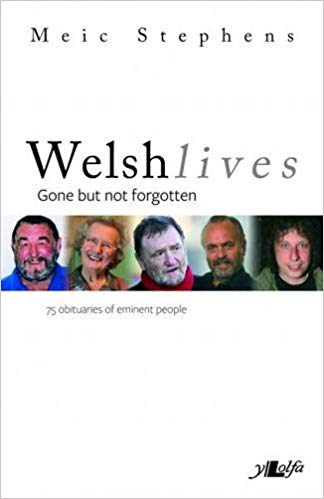Adam Somerset remembers the life and work of Welsh writer Meic Stephens as he re-reads his book of obituaries, Welsh Lives.
The tributes were rightly fulsome for Meic Stephens. Phil George, speaking for Arts Council of Wales, opened: “Meic’s scholarly and creative contribution to the literary life of Wales during the past half a century and more is of very great significance and stands as a tribute to his drive, ambition and prodigious work rate in the service of Wales and of Wales’ literature in both Welsh and English.”
The Wikipedia entry lists the important books but its roll call is limited to 13 that mattered. Phil Morris, writing for this publication July 4th, counted 170 books in the different roles of author, editor or translator. One of them, Welsh Lives, was published by Y Lolfa in 2012, and covers seventy-five lives. To read its three hundred pages is to trawl a sea of riches.

Meic Stephens’ subtitle is Gone but not forgotten, and his sub-subtitle 75 obituaries of eminent contemporaries. The pieces were first published over January 1999 to August 2012, The Independent being the principal publisher. Five featured in The Guardian and one in The Times. Cumulatively they provide a wealth of information, background and context. The occupations of Stephens’ women and men run the spectrum of sportspeople and bankers, poets and painters, politicians and civil servants, clerics and archdruids.
Some played key background roles in politics, broadcasting and academic life. Others were well-known from public appearance. Philip Madoc never failed to animate any script in any production on any stage. The public figure of Victor Spinetti was well-known. He was in characteristic form in a late public appearance at RWCMD to mark the dedication of the Richard Burton Theatre. Stephens also reveals that “a more sensitive side to his character is shown in his book of poems Watchers Along the Mall.”
Stephens summarises the impressive scholastic record of Hywel Teifi Edwards. His last paragraph evokes the quality of the public speaker, a voice of inimitable ebullience. “Gusto, eloquence and erudition,” is the spot-on description.
Some of the subjects have a familiarity from other works. Eileen Beasley had her campaign of steely-minded resistance movingly re-created in Theatr Genedlaethol’s acclaimed dramatisation. At the National Eisteddfod in 2012 an empty stall represented her living-room stripped of furniture. Will Roberts’ canvases can be seen regularly in the window of Aberystwyth’s framing shop and mini-gallery in Bridge Street. Peter Prendergast’s large, unmistakable interpretations of the quarries of Gwynedd explode off the walls of Martin Tinney’s all-white gallery. The obituary at its best is both economical and comprehensive. Arthur Giardelli is beneficiary of a summary piece that marries career, personality, artistic conviction and accomplishment.
The obituary, like all genres, has its distinctive vocabulary and traditions. In former, less open times, most mortal illnesses were beyond mention. The obituarists on the broadsheets developed a phrasing that left the reader in the know that a death had been due to cancer or Alzheimer’s. A regular circumlocutory phrasing would indicate but not state sexual preference. Stephens drops the odd intriguing phrase into his essays of honour. “A somewhat pugnacious mien and dry manner belied a sense of humour and warm-hearted approach,” he writes of one. Another makes mention that, “his time in the army sometimes showed in his imperious manner and insistence on protocol. His love of strategy, not to say plotting, was often put to good effect.” It speaks volumes.
For vividness of description, Glyn James is convivial in personality with “a mop of flame-red hair, bushy sideburns, and a sonorous voice.” Stephens has a view of television with his comment on Angharad Jones: “A cheerful acceptance of the frustrations attendant on working in a milieu where some pretty monstrous egos are at play.”
Some of the political figures may be fresh in the memory. Brynle Williams is probably more remembered for his role in rattling the government in the 2000 fuel protest than his later AM role. Peter Law and his 2003-onward battle with Labour is well retold by Stephens. The premature death of Phil Williams, he rightly calls, was “a severe blow to the political life of Wales” at a bad time for his party. The obituary on Tom Ellis takes the reader back in history with some vividness to the era of the Gang of Four and the Limehouse Declaration.
Stephens also moves abroad in one direction in his political coverage. The destination is Brittany with his coverage of five Breton scholars, broadcasters, publisher and political activists. Nearer to home the five pages on Dennis Coslett supplement the longer narrative in Wyn Thomas’ history Hands Off Wales.
The obituarist goes wherever humanity goes: the first half dozen embrace theology, genealogy, geology, film, anti-nuclear protests and scholarship of Celtic language and literature. Points in history feature; Michael Burn was part of the ill-fated Norway fighting and at the 1942 Commando raid on St Nazaire before being captured. Tasker Watkins won his Victoria Cross in action in Normandy in 1944. Civil servant John Clement was crucial in drafting policy reports that defined Wales as a political entity.
Stephens’ elegant essays also capture moments of importance in cultural history. Glyn James predated the North Sea pirate radio stations with the 1950’s broadcasts of Radio Free Wales. Dave Berry was author of the ground-breaking 1994 Wales and Cinema: the First Hundred Years. Dennis Rees was a pioneer in recording Welsh music culminating in the Sain record label. For a literary man Stephens is generous towards Iris Gower, in particular the quality of research and detail behind the “Sweyn’s Eye” series.
Meic Stephens is not just recorder but participant in cultural life. “I remember taking the French dramatist Eugene Ionescu to lunch at Plas Penglais, the Principal’s official residence,” he writes. He cites Wil Aaron on the young film industry: “As a two or three year infant, stinking slightly of gin and the sweat of the fairground, it ran slap against Evan Roberts and the religious revival of 1904.” The occasion was a symposium record edited by Stephens. He plays a part in Radio Free Wales in a “rambling old house in Merthyr Tydfil where I lived in a commune with other Plaid activists. My job was to listen for any knock on the door and, sure enough, it came.”
For the sheer strange quirkiness of our world look to the last lines on geologist Douglas Bassett. At an early stage in his life he lodged in Glasgow. His landlady “would line a drawer with greaseproof paper and fill it with enough porridge to feed him and his housemates for a whole term. He never figured out why the food didn’t go off and always found it delicious.”
The obituary is a sub-set of the category of essay. The essay may be art, albeit a minor one. The seventy-five pieces in Welsh Lives are craft but they are also fine art.
Adam Somerset is an essayist and a regular contributor to Wales Arts Review.












